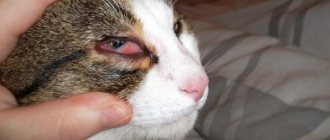Moving to a new apartment or house is often difficult - especially if you have a cat that will also be moved to a new home.
Difficulties can arise even if the cat is adequate, and the owner knows a lot about caring for her and knows how to cope with various situations. The pet may be frightened by something in the new home or experience severe stress from the situation itself - this is especially important to consider if the cat has increased anxiety.
By taking into account several recommendations regarding moving with a cat, you can minimize the risks of injury and escape of your pet, as well as find him if he got scared and hid so that he is nowhere to be seen.
Reasons when a cat hides in dark places
A cat may be hiding because, for example, it is tired of its owners’ small child and just wants peace. But it happens that the cat does not come out when called and does not respond to the rustling of food for a long time. The reasons for this behavior need to be understood. Why does a cat hide in dark places?
Cats love the most secluded places
Stress
The main reason for hiding in cats is stress. A sudden move, a visit to the veterinarian, guests, fireworks outside the window... The cat hides for any of these reasons and may not come out of hiding for a long time. Each cat is an individual, and animals with a strong psyche may not react in any way to changes in the house. But fearfulness in cats is also normal. This is a natural defense mechanism against danger.
Fear
Stress and fear always go hand in hand. A cat hides in dark places if it feels bad, in pain, or is very scared. The desire to hide can be caused by the following situations:
- New house. It is normal for a kitten to hide, run away, and sit in a secluded place for a long time. This is an adequate reaction to moving; the cat just needs a little time to get used to it. An adult cat can behave exactly the same when changing owners. She needs more time to adapt than a kitten. At night, an animal in a new house can come out, explore the apartment and meow invitingly. Such behavior should be treated with understanding.
- New animal in the house. Buying, for example, a puppy can cause severe fright in a cat. It is advisable to prevent contact between a cat and a dog at first and gradually accustom them to each other. Adult animals need more time than babies. It may take a month or more for a cat and dog to adapt to each other.
- Unusual smell. Cats navigate with their nose. And a new smell can greatly frighten your pet. There have been cases where a cat hid in horror when the owners smothered themselves with perfume before going out into the world. The animal simply did not understand what was happening and why it smelled like that.
- Fireworks. New Year is the most stressful time for cats. The rumbling outside the window causes not only horror and a desire to hide in a far corner, but also an exacerbation of chronic diseases, if any. For example, idiopathic cystitis, which is manifested by the fact that the animal cannot pee for more than 6 hours. At the first symptoms, you should contact a veterinary clinic.
- Arrival of guests. If a cat is cowardly, then his sudden escapes to secluded places should not be surprising. The main thing is not to drag the animal out by force to show it to guests. This is very stressful for the cat.
- After the trip. A cat that has been released from its carrier after a trip or visit to the doctor will immediately seek shelter. Or maybe he won’t want to leave his portable bag. In this case, it is better to leave the cat alone.
- A cat or cat may hide in the corners to mark this place. This problem is solved by sterilization or castration.
Important! After surgery, it is recommended to limit the animal's mobility. It is undesirable for the cat to hide and be out of reach. It is important that the animal is visible.
Pregnancy and childbirth
One of the harbingers of an imminent birth is a cat’s sudden desire to create a “nest” for future offspring. A cat may dig through the bed, throw out things in their closets, and hide on shelves.
Important! This is normal behavior for a woman in labor.
It is advisable not to lose sight of the cat, but also not to interfere with its activities. Better yet, prepare a place for the cat to give birth. This can be a closed box with a cut out exit or a special basket with a blanket or blanket.
It is better to prepare the place for childbirth in advance
In a playful mood, cats may hide from each other only to attack suddenly. This game is not dangerous. There are cats that attack their owners from hiding, considering them to be prey. Usually this is harmless and small predators do not extend their claws in such games.
Viruses and diseases
A cat that isn't feeling well is looking for a dark place to hide. With viral diseases, a high temperature usually rises, and the animal persistently goes to the bathroom, where the floor is cold, or simply looks for a dark, quiet place. Most cats prefer to be sick alone.
A cat got lost in an apartment or house when moving - what to do?
A common scenario is that a person moves a cat into a new home, lets it out of its carrier, the cat quickly runs out and disappears to an unknown location. She is not visible either in the corridor, or in the rooms, or in the kitchen. The fact is that the pet is scared and disoriented, and the natural reaction to this is to hide in any shelter as quickly as possible.
Of course, the owner can not worry and go about his business. Probably, by nightfall the cat will get out and go explore the space. But still, most cat owners will worry and search. In addition, you need to make sure that the pet has not climbed somewhere where there are potentially dangerous substances and objects.
Most likely, in a stressful situation, the cat will not come when called, so it is recommended:
- Calm down. A frightened and lost pet is unlikely to come out if it feels that the person is also restless;
- Turn on calm, relaxing music. Cats respond well to this;
- Arrange bowls, scratching post, tray. Rustling the bag of food;
- Use a teaser toy to attract the animal to a sound associated with positive emotions;
- Say your pet's name in a calm voice.
If the cat is found in a hiding place (under the bed, behind the sofa, behind the curtain in the bathroom, etc.), but does not want to come out of it, there is no need to force it out of there. You should make sure that everything is okay with her and give her the opportunity to come to her senses.
The pet may not allow itself to be detected for several hours. If the above measures do not help, it is recommended that you remain calm, prepare (heat, buy) food and start eating. It is very likely that the cat, smelling food and hearing familiar sounds, will come to see what the owner is doing and why someone is eating without her.
There is a high probability that the cat will retain signs of being stressed in the first days after the move - these include decreased appetite, walking on bent paws, and distrust. This is a natural reaction to a change in habitat. The pet's condition will soon return to normal.
In what cases should you not worry?
There is no need to worry if your cat has been inclined to hide and sleep in secluded places all its life. It may be worth setting up a special place for her so that she feels comfortable and safe there.
Some cats like to hide their prey in corners. The prey could be a stale cracker from the kitchen, or maybe a mouse (if the animal goes outside). It is better to check cat “hiding places” in time.
A few rules on how to behave with a “secretive” cat:
- Under no circumstances should you drag out a cat by force, much less punish it for hiding. This will not rehabilitate the cat, but it will ruin its attitude towards its owners.
- If the cat is prone to “hide and seek” or a kitten has appeared in the house, it is necessary to close access to dangerous places as much as possible. For example, where household chemicals are stored, where an animal might get stuck (sofa, closet) or where it might fall.
- It is normal for a cat to hide in dark places when a new animal appears in the home. Animals need to be given time to adapt.
- When planning renovations or rearranging furniture, it is better to keep your cat out of the room where all these activities take place. If possible, it is better to give the cat for foster care during repairs, since fine dust from the work is dangerous for animals.
- If the cat used to walk outside, then when moving to a new house it is better not to let the animal out for the first couple of months. Your pet may get confused and look for the way to the old house. It always takes time to adapt to a new place.
- It would be best to set up a “cat corner” where your pet can relax, sleep, play and sharpen its claws. Pet stores have a huge selection of cat houses with different numbers of floors. You can choose one to suit every taste and budget.
- When traveling to the country, it is also better not to let the cat out at first. She may be scared of the street. And, for example, climbing a tree far from home and not being able to get down or hide under a car.
Cat house option
A healthy adult cat has passed away - what should I do?
If an unneutered pet left home, it is possible that he began to estrus and went in search of a partner for mating. Pregnant pets often leave to give birth to offspring in a calm environment. A pet can also leave home due to poor treatment or the addition of another animal to the family. What to do when a healthy adult pet runs away? How can I get it back?
Will the animal find its way home?
Cats are territorial animals. They always strive to return to their habitat. Lost pets usually find their way home on their own. They are helped in this by vision, smell, hearing and memory. With the help of a keen sense of smell, they are able to detect the smallest concentrations of odorous substances and determine the location of the source of the smell. The hearing aid in cats is designed in such a way that they perfectly remember not just a “video sequence,” but a full-fledged “video clip” with a sound track. Thanks to this ability, they can reproduce it in memory, finding their way home.
The easiest way for a free-range pet to return to its native land is because, unlike a pet, it is familiar with the area. There are many stories about cats returning to their owners, traveling hundreds or even thousands of kilometers. There are even cases where pets returned to their owners 5 years after they went missing. Scientists have not yet been able to figure out how they do this. Presumably, cats use an electromagnetic field to orient themselves in space. How exactly they capture radiation is unknown.
How long can you wait?
If a cat is lost and has never been outside the home, the search should begin immediately after the loss is discovered. An animal not accustomed to the street may run away out of fear in an unknown direction and get into trouble. The more time passes from the moment your four-legged pet left home, the less chance you have of finding it.
Don’t panic and search the entire yard if your pet, which is free to go outside, went for a walk a few minutes ago. You should start searching if the animal has not returned by the end of the day. It is advisable to begin the search operation before dusk, so that the cat does not have to spend the night in the open air, and its owners do not have to worry all night.
Where to look for a pet first?
To return a pet, sometimes it is enough to search the home. Perhaps the cat did not go somewhere beyond its boundaries, but simply hid, for example, under a sofa, closet, bathroom, behind a curtain, in a box, on a sideboard or in a pantry. Some tailed pranksters like to hide in the washing machine. If the animal was not found in the house, you need to look for it:
- Under the windows. Perhaps your pet, while hunting for a bird or a sunbeam, fell from a balcony or window.
- At the entrance. If a cat sneaks through a slightly open door, it can be found on the upper or lower floor.
- In the attic, when there is easy access to it.
- In an open basement where a frightened pet that had fallen out of a window could hide.
- Under the cars. Frightened animals, once outside, look for secluded places.
- On the nearby trees. To escape from dogs, passing cars, and aggressive relatives, they climb higher.
- In neighboring areas. If a cat has disappeared from a private home, it may be hiding with neighbors.
- In buildings located in the local area: in a garage, bathhouse, barn, woodshed.
If the missing tailed animal has not been discovered, you should not give up trying to find it. You should ask your neighbors if the cat has wandered into theirs. You also need to walk along the road, suddenly an animal trying to cross it is hit by a car, it lies on the side of the road, and it can still be saved.
Children love animals and are unlikely to let a well-groomed beautiful cat walk out of their sight. It is worth asking local children if they have seen the cat. It is necessary to name the special features of the pet.
You should try to look for your pet again when it gets a little dark and the bustle outside has died down. In the silence of the night, extraneous sounds will not drown out the owner’s call, and there is a high probability that the cat will respond to a familiar voice. In addition, in the dark, the animal can be given away by its glowing eyes. Grandmothers talking on a bench near the entrance, janitors, mothers with strollers - all these people can help in the search for a missing animal.
Photophobia in cats
With photophobia, the cat will also look for a secluded dark place and squint at the light, as it irritates the eyes and hurts the cat. This may be an alarming symptom indicating the following conditions:
- eye injury (mechanical, chemical, thermal);
- allergic reaction;
- stroke;
- concussion;
- rabies.
Eye injury in a cat
Note! If the animal is not vaccinated and roams freely on the street, then photophobia may be a symptom of rabies. Rabies is deadly for animals and people, the mortality rate is 100%.
At the first symptoms (photophobia, hydrophobia, drooling, aggression), you must consult a veterinarian! It is also necessary to avoid as much physical contact with a potentially infected cat as possible. Rabies is transmitted through the bite of a sick animal when saliva enters the bloodstream.
You can hear better
- In the corner of the room the sound is different and stronger - some cats may simply be fascinated by this.
- If your cat sits in the corner and meows, he may just be listening to himself. Older cats that have hearing problems do the same - when they meow in the corner, the sound becomes stronger.
- It is also possible that the pet is trying to get your attention in this way.
Contacting a veterinarian
It must be remembered that the best treatment is prevention. A preventive visit to a veterinarian will help identify diseases in the early stages and begin treatment immediately. Your cat also needs to be vaccinated once a year. If desired, you can combine vaccination and a preventive appointment with a veterinarian.
If the following symptoms appear, a visit to the doctor is mandatory.
Lack of appetite
If the cat does not eat, does not want to drink and refuses its favorite treats, and sleeps all the time in a secluded place, a trip to the clinic cannot be postponed. Fasting is strictly contraindicated for cats, since prolonged refusal to eat leads to disruption of liver function.
Lethargy
Lethargy, apathy and drowsiness may indicate severe intoxication or high fever. It is necessary to figure out what could cause this condition. A visit to a veterinarian in such cases is mandatory.
Loss of coordination
If your cat begins to fall over on its side when walking, has difficulty moving its paws, or crashes into walls, a visit to the veterinarian is necessary. Loss of coordination is an alarming symptom and can indicate both vision loss and brain dysfunction.
Another symptom of a concussion or stroke is different pupils
Other
Along with the desire to hide, a cat may have the following symptoms:
- refusal to eat;
- diarrhea;
- vomit;
- apathy, lethargy;
- dull coat;
- urine mixed with blood or no urine;
- discharge from the eyes and nose;
- bad breath;
- a strong change in behavior - aggression in a usually kind cat or sudden sympathy in an aggressive animal. If a cat suddenly begins to lick and caress, this should alert you;
- profuse salivation.
Important! If any of these symptoms appear, you should immediately contact a veterinary clinic!
Cats are very mysterious animals. Why do they like to hide in boxes, climb into dark corners and jump around the apartment at night? Only the cat god knows. But sometimes a game of hide and seek can be harmless, and sometimes it’s better to play it safe and take your pet to the vet. This specialist will tell you in detail what behavior of your pet should be alarming and what is considered normal. Do not forget that prevention is always easier and cheaper than treatment.
Owners sometimes notice that their cat hides in dark places or begins to look for cover. This phenomenon can be either periodic when a stranger appears in the apartment, or constant. If your pet demonstrates this behavior for no particular reason, then you should observe it. Then it will definitely be revealed why the animal “plays hide and seek.”
Where to look for her hidden places?
As many cats as there are, probably, there are as many secluded places where they can hide within the apartment. But, talking with other owners of these animals, I discovered one pattern for myself. After all, they have common favorite places where they like to hide. I’ll tell you about them now. I ask the cats not to be offended by me for giving away their secret.
Cabinets
Cats love to climb into closets and sit there among clothes and linen. And enjoying the cleanliness and peace, they fall asleep peacefully. It is not clear whether their sleep is so deep and sweet that they do not wake up when their owner calls them. It is possible that your pet can hear everything perfectly. And he doesn’t respond because he doesn’t want to interrupt his idyll of afternoon sleep. Or maybe this is simply a manifestation of the harmfulness of her capricious and proud character.
Under the bath
Under the bath is warm, dark and cozy. There, our pets especially like to disappear during folk festivals, celebrated with loud volleys of fireworks. After all, everyone probably knows that cat ears are so delicate that any loud sound causes them great discomfort. When a cat hears the incessant firing of fireworks, it gets scared and tries to run as far as possible from these disturbing sounds. From my own experience I was convinced that you can call her and look for her for hours. He'll only come out when it's quiet outside.
On the loggia
There was a case in my life when a cat got lost in a closed apartment. And it was impossible to find her for many hours. Everything was done to search for her: the ringing of the bells of her favorite toys, the sound of food rustling in the box, and the slamming of the refrigerator door. Believe it or not, I even went outside into the courtyard of the house, asked passers-by about the cat, and called her affectionately.
By evening it became clear that the cat was missing. After crying a lot, I decided to print advertisements on the search for a cat. All that remained was to start the print when my sleepy little loser appeared in person in the doorway of the loggia. It turns out that she slept there all day under an inverted pelvis. She slept well, gained strength, and then at night she gave chase with an imaginary animal. All this was accompanied by her victorious screams and stomping paws.
Behind the curtains near the battery
If the cat is missing and the heating season has already begun, look near the radiator behind the curtains. Cats really like this cozy and secluded place. How warm, dry, no one sees her, but she herself has a great opportunity to eavesdrop and observe everything that happens. When you search, be sure to pull back the curtains and look below.
A few more places to look:
- In a toy box.
- In a crib.
- Under the blanket on the bed.
- Under the bed.
Of course, each apartment is designed differently. For this reason, I advise you to take note of where your cat appears after a long absence. So, by trial and error, you will be able to find the secret hiding places of your pet.
Why does a cat need to hide?
The desire to hide in a dark place for a while is quite common among domestic cats. The hunter's instinct prompts them to take a position in a secluded corner so that they can calmly observe what is happening without being noticed. In other cases, especially small kittens, they want to be in a warm, cozy “nest”, where they are comfortable and safe. Fur babies grow and sleep a lot, so they need proper rest. Constantly playing TV and other noises do not provide the opportunity to have a good rest. Truly deep sleep is only possible in darkness and complete silence.
It should not be surprising that cats find secluded corners in completely different places.:
- closet,
- box,
- under the bed or sofa,
- washing machine drum,
- on the shelf,
- behind the battery,
- under the owner's blanket.
If the cat hides constantly, then you need to buy one for it in a special store or make a house yourself. Fluffy pets love such shelters. This is connected not only with psychology, but also with physiology. Cats often sleep curled up. When sleeping in a confined space, they can lean their back against the wall of the house, thus relaxing their muscles.
Intruder in the house
Is your cat sitting right in the corner with her ears up and looking at something?
- He's probably hunting for something!
- Spiders, ants and moths can often be found in corners - you may miss a little worm, but your little miracle is not sleeping! There is nothing there? It doesn’t matter - it’s enough that the cat has already found an insect in this place. He could remember it and was now checking to see if it had reappeared.
- It is also possible that your pet hears some movement in the walls, such as the movement of mice.
Main reasons for seeking shelter
There are many explanations for why a cat hides in dark places. In some cases, the shelter is not always truly dark, but simply cool or, conversely, warm. There may be several favorite places for a pet, often they are well known to the owner. It is advisable not to disturb the animal at such a moment, because sometimes he needs to be alone with himself.
Why does a cat try to be invisible, let's name common reasons:
- character trait;
- the presence of another, older cat in the house;
- the need to calm down after suffering stress;
- anticipation of the appearance of offspring;
- desire to play;
- desire for security.
Timid by nature
By nature, some cats are sociable, while others prefer loneliness. Those who belong to the second category instinctively try to be “in the shadows” more often, which guarantees safety. Such a kitten will not sleep on a wide sofa with its tummy up, with its paws spread to the sides. Also, he will not once again catch someone’s eye. You can force him to come out of hiding with gentle words, a favorite treat, or a bright, entertaining toy.
If the cat is hiding, then you should not lure it out or put pressure on it. Perhaps something alarmed her, someone scared or offended her. She will go out on her own when she considers it necessary, wants to eat or take a walk. If you do not allow the predator to avoid an unpleasant situation, then its anxiety will only intensify.
Trying to get peace and comfort, even sociable cats hide. They may find a place for themselves in the linen closet or on the cool wooden floor under the bed. It all depends on whether the pet is cold or hot.
Away from the Boss
The presence of another cat or an older cat in the house causes the younger cat to hide more often. The owner can create a maze of boxes especially for him, through which he can easily get to a bowl of food or tray. The boxes must have multiple entrances and exits so that you can escape in time, avoiding a dangerous or unwanted collision with your opponent.
What to do if your cat constantly hides in a dark place. We need to keep an eye on her. If her health is fine, her fur is shiny, and her nose is wet, then the pet’s behavior is due to other reasons.
Relief from stress
After getting into an unpleasant situation or being offended, even the most sociable cat hides in order to survive the stress and regain equanimity. Cats get used to their home and don’t really like change. If a kitten is taken to another family, the naturally cautious animal will need time to adapt. In the first days, the pet will react sensitively to any sounds or movements, and if it senses danger, it will definitely hide.
When moving to another house, the cat becomes restless. For the first time, you can place him in a small room. Gradually he will get used to it and begin to explore other rooms. You will definitely need to take his bed, bowl, and tray from the old apartment. Having familiar things around will allow your pet to calm down a little and feel more confident.
Tamed domestic cats get used to it faster than those adopted from a shelter or from the street. It is not so easy to regain the trust of an animal that has lost its former home. It will take patience, a calm atmosphere and a kind attitude.
Interesting situation
Pregnant cats begin to hide in dark places, which means kittens will be born soon. To prevent your cat from hiding and throwing your things out of your nightstands and closets in search of a suitable place to place her offspring, prepare a box with soft bedding for her. Place it in a convenient place so that the cat and babies will not be disturbed.
Let's play hide and seek or go hunting
If your kitten hides under the sofa during the day and hits its owner by the legs, then in this way he is simply playing hunter. For him, a dark place is an ambush from which he stalks his prey. Some cats won't mind running around and playing chase, hide and seek, or cat and mouse. They can realize their natural hunting instinct at home only through play.
Organization of searches
The sooner the search begins, the greater the likelihood that you can find your lost pet. In addition, if the search is started in a short time, then the cat or cat that ran away will not go far
It is important not to be upset: a bad mood will definitely not help in catching a runner or fugitive
Before going out and searching other places where a lost pet may be, it is worth looking through the entire apartment. No matter how trivial it sounds, the animal can be in the room - it’s just hidden. Where can I find a cat in this case? Every inch should be searched. It is worth looking not only where the pet previously liked to spend time, but also in places uncharacteristic for it.
So, you should pay special attention to the following “shelters” for your pet:
- cabinets and cabinet space;
- mezzanine;
- space under the bathroom;
- under furniture;
- behind the curtains and others.
When to be wary
If a cat begins to hide in dark, cool places, then this is an alarming and not a very good sign. It is possible that in this way she is trying to get rid of high body temperature.
The increase in temperature is a consequence:
- scared, scared
- physical activity,
- hot weather,
- poisoning,
- acute pain.
This condition quickly normalizes. But if the temperature rises sharply by several degrees and does not subside for a long time, then this is a sign of the development of pathology. In this case, the animal must be urgently shown to the veterinarian.
How to understand that a cat is not feeling well. At these moments, her behavior changes sharply, she stops eating, sleeps a lot, does not want to use the litter box, meows pitifully, hides in a dark place - this signals the onset of the disease. Other symptoms may include diarrhea, vomiting, mucus from the nose and eyes, and hair loss. When an animal tries to perch on a tile or cold floor, such behavior indicates its poor condition. Most likely, the pet needs medical attention.
As cats age, they increasingly desire privacy; they are irritated by noise and bright lights, so they take refuge in dark places. Old animals may partially lose hearing, vision, sense of smell, or become ill.
Many furry pets love to climb into bags and boxes; some manage to lie down in a vase or pan. This should not cause concern to the owner. You just need to be careful not to move the chair or chair abruptly, as the animal may sit under it and get hurt. Before turning on the stove or washing machine, first look inside to see if there is a fluffy ball there. Try not to let the cat's fun with hide and seek turn into a tragedy. Complete mutual understanding will be the key to a pleasant life together.
At the beginning of this week we once again went to the forest to pick mushrooms. Someone will probably say, it’s already cold. Yes, it’s not hot, but walking through the forest is quite normal, the main thing is not to forget to put on a hat so that your head doesn’t get too cold, and be sure to take a cape with a polyethylene hood in case of rain.
Make bait
Felines' sense of smell is much better developed than vision, so smell is an important landmark that can lure a lost pet.
Baits are placed within a radius of 100-200 meters from the house or a little further, preferably in places that can be checked regularly. You can use the following “beacons” for searching:
the owner's things - the cat will be attracted by an old jacket or slippers with a familiar smell; a toy, bedding or other favorite thing - a pet can follow its own scent; a small amount of filler from the tray will remind you of the marked territory of the house; food or treats - you can use it, but be careful; most likely, the feeder will attract stray animals. Walk around the marked points about two to three times a day; it is better not to get too close to them, but observe from the side
Walk around the marked points about two to three times a day; it is better not to get too close to them, but to observe from the side.
How long can it take for a missing cat to return?
Real-life cases show that lost cats can return home after several months or even years. According to statistics, up to 50% of lost owners find their pets healthy and unharmed.
65% of cases confirm the fact that cats return home from distant places (cottage, village or other places where the animal was early). Intensive searches, patience and perseverance increase the chances of finding the loss within a short time.
Therefore, if the cat suddenly disappears, then you need to immediately start searching in all possible places. In this case, the animal can return home on its own after some time. Much depends on the pet and the circumstances of each specific situation.
It's best to do your best and try to check all your options. The loss of a beloved pet is an unpleasant matter, but it can be resolved if you follow the recommendations presented.











